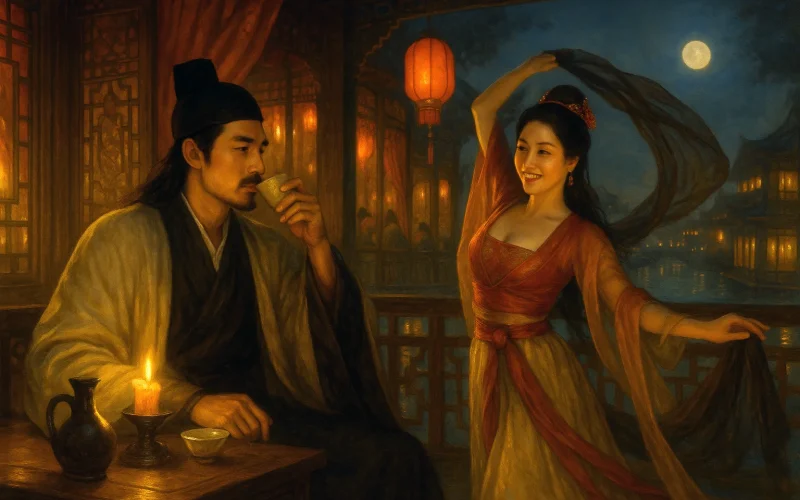In my fallen days, I wandered rivers and lakes, my boat ever laden with wine;
Where beauties with willowy waists from the South danced, light as a feather, so fine.
Now, ten years later, I wake as if from a Yangzhou dream, long and deep —
And all I have gained is the reputation, in those blue mansions, of a love shallow and cheap.
Original Poem
「遣怀」
杜牧
落魄江湖载酒行,楚腰纤细掌中轻。
十年一觉扬州梦,赢得青楼薄幸名。
Interpretation
This poem was composed after the year 848 AD during the Dazhong reign period of Emperor Xuanzong of Tang. By this time, Du Mu was nearing fifty, having served as the prefect of Huangzhou, Chizhou, and Muzhou. His life had entered an autumnal season of reflection and retrospection. The title “Unburdening My Heart” suggests the act of dispelling inner melancholy, yet its emotional core extends far beyond simple regret or nostalgia. It represents, rather, a profound interrogation and sober reckoning by a poet—who once famously mocked himself with the line “Ten years I seemed to have dreamed away in Yangzhou, / And gained in the Blue Houses naught but a fickle name”—of his own worth and the meaning of his existence at the midpoint of his life.
For Du Mu, his years in Yangzhou (during the Taihe era) were a stage where his “vigorous and brilliant” poetic style and unrestrained personality were given full expression. However, they are often viewed by later generations as a mere footnote to his “unconventional and dissipated” character. Placed within the context of the intense factional strife and arduous official career paths of the late Tang, this libertine lifestyle of “roaming with wine” can perhaps be understood as a form of passive resistance and emotional release born of disillusionment with political reality. A decade later, when the poet uses the phrase “seemed to have dreamed” to describe that long span of time, it conveys a sense of temporal disillusionment and a crisis of identity that far transcends any mere moral judgment of his past conduct. It reveals how a man of brilliant talent, caught in the fissures of his era, saw his vital energy—initially directed toward the ideal of serving the world—partially dissipate in “the world beyond” and “the pleasure houses,” ultimately crystallizing into a single, complex line of self-definition. This poem thus stands as one of Du Mu’s most autobiographical and philosophically profound works.
First Couplet: 落魄江湖载酒行,楚腰纤细掌中轻。
Luòpò jiānghú zài jiǔ xíng, Chǔ yāo xiānxì zhǎng zhōng qīng.
Adrift, I roamed the rivers and lakes, ever with wine in hand, Enchanted by those willowy waists, light as a dance on a palm, so grand.
The opening phrase “adrift” establishes the poem’s overall somber emotional tone. This refers not to material poverty but to a state of spiritual disillusionment and rootlessness. The combination of “rivers and lakes” and “roamed… with wine” sketches the image of a man deliberately distancing himself from courtly duties, using wine and libertine behavior as his armor. “Willowy waists… light as a dance on a palm” employs two allusions in quick succession: “willowy waists of Chu” refers to the King of Chu’s famed preference for slender waists, while “light as a dance on a palm” alludes to Empress Zhao Feiyan of Emperor Cheng of Han, renowned for her lightness, said to be able to dance upon a palm. This line vividly depicts an immersion in sensual pleasures. While the language is ornate, it subtly conveys a sense of deep indulgence. The poet presents his former self as a “wanderer of the rivers and lakes” absorbed in a world of sensory experience—a portrayal that is both recollection and a form of distanced self-scrutiny.
Final Couplet: 十年一觉扬州梦,赢得青楼薄幸名。
Shí nián yī jiào Yángzhōu mèng, yíngdé qīnglóu bóxìng míng.
Ten years in Yangzhou passed like a single dream, now cold; And gained me nothing but, in pleasure houses, a renown as heartless and old.
This couplet strikes like a sudden thunderclap, forming the soul of the poem. “Ten years” and “like a single dream” create a startling juxtaposition, instantly rendering a substantial decade of lived experience insubstantial and dreamlike. The word “dream” signifies a belated awakening and, more profoundly, a chilling sense of existential emptiness. It declares that those seemingly vibrant years were, in essence, hollow and illusory. The verb “gained” is the essence of the poem’s bitter irony. Its usual connotation is to acquire or achieve, often associated with merit and honor. The poet, however, juxtaposes it with “a renown as heartless” in “pleasure houses”—a deeply disparaging label. This pairing is filled with sharp self-mockery. This “renown as heartless” is a tag bestowed by others, yet it also appears to be a verdict the poet ultimately acknowledges and pronounces upon himself, mingling regret, resignation, self-pity, and the bleak, wry smile of one who has seen through the illusion.
Holistic Appreciation
This heptasyllabic quatrain is a highly condensed, emotionally complex “spiritual accounting.” It employs a structure of first enacting the immersion, then revealing the emptiness, building emotional tension to its peak in the final two lines before releasing it with devastating force.
The first couplet recreates the scenery “within the dream” with descriptive flair, using classical allusions and evocative, sensual imagery that might almost lead one to mistake the poem for a work of romantic self-indulgence. The final couplet, however, executes a dramatic reversal. “Ten years… passed like a single dream” acts like a dousing of cold water, instantly deconstructing all the splendor and pleasure depicted earlier, relegating them to the status of a mere “dream.” The coupling of “gained” with “a renown as heartless” pushes this deconstruction into the realm of stark self-negation. This immense contrast between the halves produces a powerful artistic effect: it allows the reader to experience alongside the poet the violent psychological shift from “living the dream” to “awakening from the dream,” thereby feeling deeply the emptiness that follows faded splendor, the profound sorrow concealed beneath the self-mockery, and the heavy sigh for time irretrievably lost.
The poem’s success lies in its transcendence of simple moral confession to touch upon fundamental questions of existence. It asks: when a person defines a significant portion of his life (even a seemingly dissolute part) as nothing but a “dream,” how should he reconcile with his own history? Is the “renown as heartless” truly the complete story? Perhaps, beneath this layer of self-mockery, there also lies a secret nostalgia and complex mourning for that period of unfettered life on the “rivers and lakes”—a life that, for all its flaws, represented a partial escape from conventional societal norms.
Artistic Merits
- The Disillusioning Power of Temporal Rhetoric: “Ten years… passed like a single dream” is Du Mu’s original and philosophically potent expression of time. It compresses a long, event-filled decade into the brief, hollow experience of a “single dream.” This distortion of temporal perception masterfully conveys the collapse of perceived value and a profound sense of existential emptiness, establishing a classic model for expressing sudden, shocking disillusionment with the passage of time.
- Profound Employment of Irony and Self-Mockery: The entire poem utilizes “adrift” as self-description, “gained” as bitter irony, and “renown as heartless” as piercing self-mockery. This self-deprecation is not superficial remorse but a rhetorical strategy of objectifying the self for the purpose of cold, analytical dissection. It allows the expression of deep emotion to avoid sentimentality, instead presenting a tone of bitter wisdom and bleak humor that significantly enhances the poem’s tension and lingering resonance.
- Contrast Between Sensual Imagery and Somber Theme: Imagery like “willowy waists,” “dance on a palm,” and “pleasure houses” carries strong connotations of romantic dalliance and hedonistic pleasure. In stark contrast, words like “adrift,” “dream,” and “heartless” point toward spiritual despondency and existential emptiness. The juxtaposition of these two sets of imagery within the same poem uses surface brilliance to underscore underlying bleakness, creating a potent sensory and psychological juxtaposition that deepens the thematic impact.
- Skillful Manipulation of Narrative Perspective: The poem employs a deliberate interweaving of a “past continuous” and a “present perfect” perspective. The first couplet offers an immersive recounting of the past, as if reliving those moments. The final couplet shifts to a detached, summative judgment pronounced from the vantage point of the present. This sudden pulling back and elevation of viewpoint creates the jarring effect of “the moment of awakening,” showcasing the poet’s structural ingenuity.
Insights
This poem functions like a clear, cold mirror, reflecting a universal human dilemma: How do we confront and evaluate our own past, especially those parts that may not align with conventional virtue or even seem somewhat “wayward”? Du Mu’s answer is not simple erasure or confession. Instead, through the poetic formulation “passed like a single dream,” he acknowledges the illusory, phantom-like quality of that time, and through the sharp self-mockery of “gained me nothing but… a renown as heartless,” he performs a sober, poignant settling of accounts with that period.
It suggests that true maturity and self-reflection may involve the capacity to reconcile with the less illustrious chapters of our personal history. This reconciliation is not about making excuses but entails a deep acknowledgment, an unflinching analysis, and giving that experience form through artistic language. That “Yangzhou dream,” though defined as a dream, once burned intensely with the poet’s youth and passion. That “renown as heartless,” though a reproach, also became a distinctive mark within the complex tapestry of his life.
Ultimately, the poem leaves us not only with a cautionary note about “not squandering time” but also prompts reflection on the integrity of a lived life. A human existence is perhaps woven from threads of “serious” endeavor and episodes of perceived “folly.” What may be important is not the outright negation of any part, but possessing, in retrospect, the insight and expressive power—as Du Mu did—to distill diverse experiences into a line as potent as “Ten years… passed like a single dream.” It is through such synthesis, encompassing both laughter and tears, that we may achieve a clearer recognition and acceptance of the selves we have lived.
About the poet:

Du Mu (杜牧), 803-853 AD, was a native of Xi'an, Shaanxi Province. Among the poets of the Late Tang Dynasty, he was one of those who had his own characteristics, and later people called Li Shangyin and Du Mu as "Little Li and Du". His poems are bright and colorful.












